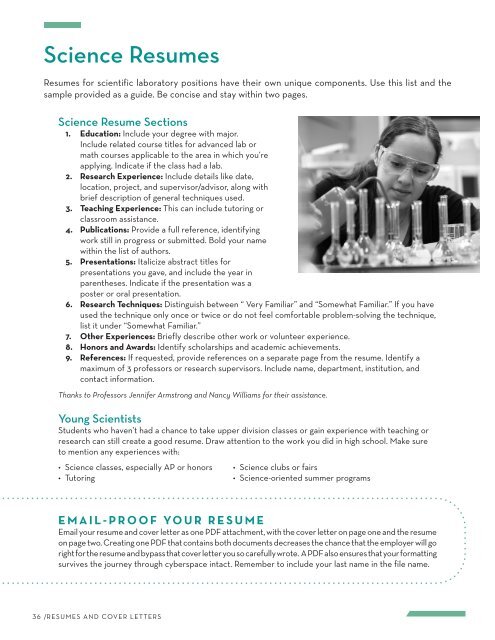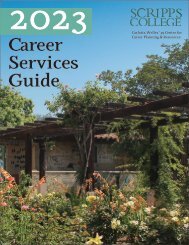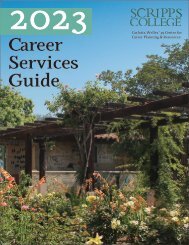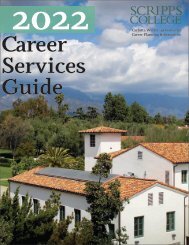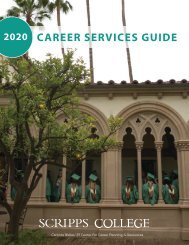2021 Career Services Guide
You also want an ePaper? Increase the reach of your titles
YUMPU automatically turns print PDFs into web optimized ePapers that Google loves.
Science Resumes<br />
Resumes for scientific laboratory positions have their own unique components. Use this list and the<br />
sample provided as a guide. Be concise and stay within two pages.<br />
Science Resume Sections<br />
1. Education: Include your degree with major.<br />
Include related course titles for advanced lab or<br />
math courses applicable to the area in which you’re<br />
applying. Indicate if the class had a lab.<br />
2. Research Experience: Include details like date,<br />
location, project, and supervisor/advisor, along with<br />
brief description of general techniques used.<br />
3. Teaching Experience: This can include tutoring or<br />
classroom assistance.<br />
4. Publications: Provide a full reference, identifying<br />
work still in progress or submitted. Bold your name<br />
within the list of authors.<br />
5. Presentations: Italicize abstract titles for<br />
presentations you gave, and include the year in<br />
parentheses. Indicate if the presentation was a<br />
poster or oral presentation.<br />
6. Research Techniques: Distinguish between “ Very Familiar” and “Somewhat Familiar.” If you have<br />
used the technique only once or twice or do not feel comfortable problem-solving the technique,<br />
list it under “Somewhat Familiar.”<br />
7. Other Experiences: Briefly describe other work or volunteer experience.<br />
8. Honors and Awards: Identify scholarships and academic achievements.<br />
9. References: If requested, provide references on a separate page from the resume. Identify a<br />
maximum of 3 professors or research supervisors. Include name, department, institution, and<br />
contact information.<br />
Thanks to Professors Jennifer Armstrong and Nancy Williams for their assistance.<br />
Young Scientists<br />
Students who haven’t had a chance to take upper division classes or gain experience with teaching or<br />
research can still create a good resume. Draw attention to the work you did in high school. Make sure<br />
to mention any experiences with:<br />
• Science classes, especially AP or honors<br />
• Tutoring<br />
• Science clubs or fairs<br />
• Science-oriented summer programs<br />
EMAIL-PROOF YOUR RESUME<br />
Email your resume and cover letter as one PDF attachment, with the cover letter on page one and the resume<br />
on page two. Creating one PDF that contains both documents decreases the chance that the employer will go<br />
right for the resume and bypass that cover letter you so carefully wrote. A PDF also ensures that your formatting<br />
survives the journey through cyberspace intact. Remember to include your last name in the file name.<br />
36 / RESUMES AND COVER LETTERS


